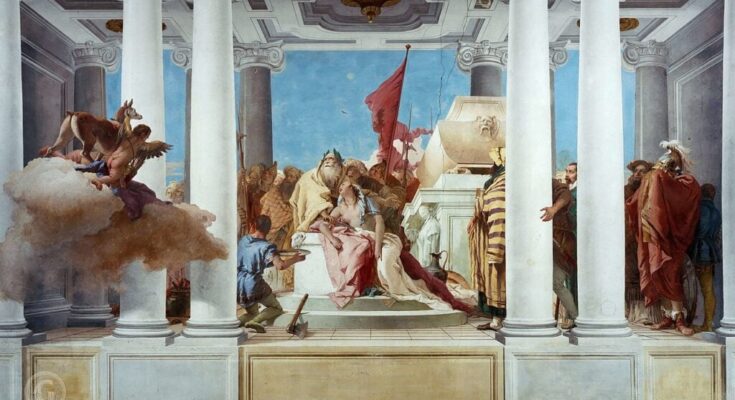
The name Iphigenia has been synonymous with ancient Greek tragedy and mythology as well as the concept of sacrifice for millennia.
This fascinating woman is a truly captivating figure in ancient Greek mythology, whose story is one of sacrifice, family loyalty, and much-needed divine intervention.
As the daughter of prominent King Agamemnon and Queen Clytemnestra, the life story of Iphigenia is a tale that became a prominent chapter in the epic moments of the Trojan War. More particularly, the House of Atreus has fascinated enthusiasts of ancient Greek culture for centuries.
Iphigenia’s sacrifice was a defining moment
The intriguing story of Iphigenia begins in the kingdom of Mycenae. There, this monumental character of ancient Greek mythology was born into a lineage that had been marked by successes, glory, and tragedy.
Her beloved father was the famous Agamemnon, the commander of the joined Greek forces during the legendary Trojan War that shaped the history of Greece forever.
As the Greeks were preparing for the expedition, they gathered at Aulis. Their mission was simple: embark on their journey to Troy and get the job of bringing back Helen, the queen of Sparta, done. Unfortunately for them, however, they found themselves significantly challenged by unfavorable winds.
It was then that the famous seer Calchas told the Greeks that the goddess Artemis was enraged by Agamemnon’s unholy decision to slay a sacred deer. This is why Artemis required a sacrifice, and the sacrifice was going to be devastating. The life of Iphigenia herself was the demanded price for the winds to change and allow the Greeks to set tail for Troy.
Initially, King Agamemnon was caught between his pressing obligations as a leader and his paternal love as a father of a beautiful daughter.
However, the King had to face reality. Pressured by the Greek chiefs, he finally and hesitantly consented to the sacrifice of his beloved daughter. Therefore, Iphigenia was lured to Aulis under the pretense of marrying the popular hero Achilles. This was a deception that was used to blindfold her from the tragedy that was upon her.
It has to be noted that there are some versions of this ancient Greek myth in which Iphigenia willingly embraced her tragic fate, opting to sacrifice herself for the greater good of the nation.
Iphigenia’s deliverance in ancient Greek mythology
This tragic tale of Iphigenia in ancient Greek mythology does not end there. It actually takes a remarkable turn with the unexpected intervention of Artemis herself.
As Iphigenia was on the brink of being sacrificed for the winds to turn favorable for the Greeks, the goddess decided to substitute her with a deer. She then transported her to Tauris, which was a distant land where Iphigenia would become a priestess in the temple of Artemis herself.
This remarkable divine intercession not only spared Iphigenia from a brutal death but also paved the way for her eventual reunion with her beloved brother, Orestes.
It was years later when Orestes, who was tormented by the Furies for the murder of their mother Clytemnestra, was asked by the god Apollo to retrieve a sacred statue of Artemis from Tauris, the place where Iphigenia was sent by goddess Artemis.
Therefore, joined by his friend Pylades, Orestes obeyed the divine will and was thus brought before Iphigenia. His beloved sister was now the one responsible for performing sacrifices of foreign prisoners.
Initially, the siblings did not recognize each other; however, they soon disclosed their identities to each other, in a remarkable revelation of fate. This had as a result a quick escape back to their motherland Greece, along with the sacred statue that Orestes was tasked to bring.
Of course, the story of Iphigenia is a really complicated one, with deeper twists and turns. However, the foundational message of this tale has been immortalized in various works of literature and drama. The most notable one is Euripides‘ plays ”Iphigenia in Aulis” and ”Iphigenia in Tauris”.
These two plays have become somewhat classic in ancient Greek literary tradition and hold a prominent place in ancient Greek mythology. This tale of tragedy and hope is one where fate, divine will and human agency are blended in a spectacularly resonating way. These are themes that have captivated audiences for centuries and continue to be extensively studied by scholars of ancient Greek culture.
If we zoom out and see this story in the broader context of ancient Greek mythology, the life story of Iphigenia puts moral dilemmas faced by individuals caught between personal desires and societal norms under the spotlight.
Iphigenia continues to personify the timeless themes of sacrifice and redemption. Her story is a classic in terms of richness in drama and emotion. This is why it continues to inspire and provoke thought.



